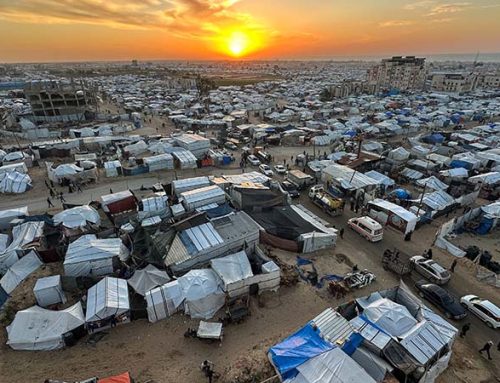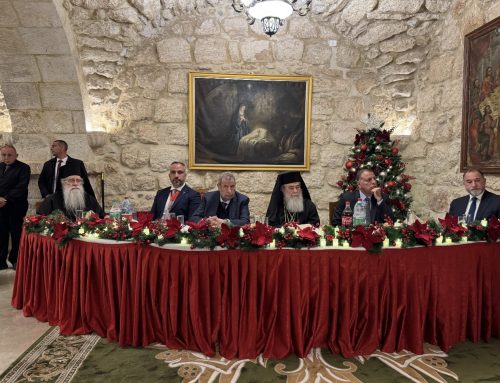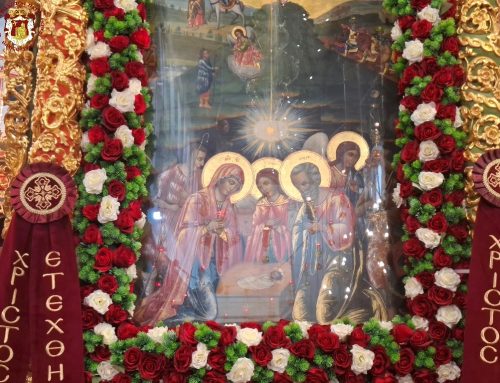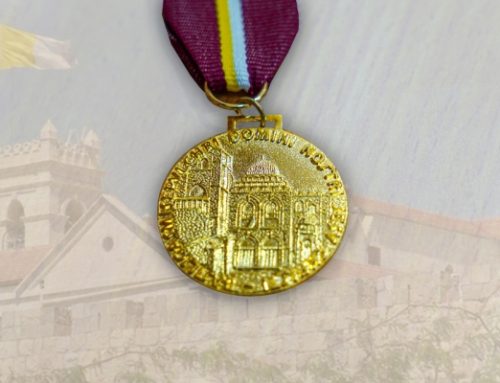By Kieran Halloran – Georgetown University
The 13th International Conference kicked off with a panel discussion which reviewed the different challenges facing Christians in the Holy Land and ways to overcome them.
The panelists included, moderator Fr. Drew Christiansen, S.J., Editor-in -Chief of America Magazine and HCEF Co-Founder and Advisory Board member, Bishop William Shomali, Auxiliary Bishop, Latin Patriarchate of Jerusalem and Reverend Samer Azar, Pastor, Evangelical Lutheran Church of the Good Shepherd, Amman, Jordan.
Bishop Shomali began with a description of how the economic, political and religious situations in the Holy Land contribute to the challenges faced by the Christians there. He spoke about the poverty of the Palestinians compared to the rest of Israel and how the taxes transferred from Israel to Palestine account for the second biggest source of income for Palestine. This economic tension is supplemented by an unequal land and water distribution throughout the Holy Land. Bishop Shomali explained that while Israelis are given continuous access to running water, the Palestinian neighborhoods use wells run by the Israeli government that only deliver a restricted amount of water. The land and water restrictions placed on Palestinians have only furthered the tensions between the Palestinians and Israelis.
Bishop Shomali further addressed concerns about the barriers that exist between Palestine and Jerusalem and the effect those have on the Holy Land. One major effect of these barriers and road blocks is a lack of understanding between the Israelis and Palestinians. Due to the separation of the two groups of people, there is no mutual understanding which is necessary for a peaceful coexistence of the two groups.
Regarding the effects politics has on the Holy Land conflict Bishop Shomali made this statement, ‘the reason the conflict is so complex is that the nature of the dispute is an ideology that is manifested in religious and political beliefs. But even though political issues may have deterred dialogue in the past, The Bible has a base for interaction between the two religions.’
Bishop Shomali finished on a high note saying that things are not so bleak. He cited the recent prison exchange between Israeli and Palestinian authorities as an example of a working dialogue, and that, ultimately, it won’t be the work of politicians but the work of God that restores peace to the Holy Land and that despite the conflict, we must have hope.
Reverend Azar shared how the recent “Arab Spring” is a witness of the thirst for liberties, freedoms and democracy throughout the Middle East. He then expressed his confidence that the two-state solution in Jerusalem works towards peace and justice and could resolve all outstanding conflicts between the Israelis and Palestinians.
Reverend Azar described the Christian role in the Holy Land as the “glue of Arab Society” between the Jews and Muslims. He then explained the challenges to Christians in the Holy Land are not Islam, but a ‘fear’ of political fundamentalism, an impasse in the peace process, a lack of freedoms and the Holy Land’s unstable political situation in the world. He also added that the low birth rate among Christians in the Holy Land, forced emigration and political instability have also threatened the existence of the Christians in the Holy Land.
Despite these challenges, Reverend Azar described the peaceful coexistence of Christians and Muslims in Jordan as a source of hope. He described the state of tolerance in Jordan, citing examples such as the recognition of Christmas as a national holiday in Jordan and the equality of the Ecclesiastical and Islamic courts. He stated that ‘it is the focus on the common love of God and love of neighbor that has fostered the understanding between Christians and Muslims in Jordan.’
Reverend Azar explained five things that he believes are necessary for the future coexistence of Christianity, Judaism and Islam in the Holy Land, they are: the creation of modern civil societies, an end to the Palestine conflict, and a promotion of understanding, the formation of moderate Arab states and an increased awareness of local Arab Christians are necessary for the continued success of Christianity in the Holy Land.
The panel about Christians in the Holy Land was both informative and encouraging. Both Bishop Shomali and Reverend Azar provided wonderful insight into the daily life of Christians in the Holy Land as well as the greater role Christians play in the Holy Land. This panel was truly an excellent way to kick-off the conference.
By Kieran Halloran – Georgetown University Class of 2014
[/fusion_builder_column][/fusion_builder_row][/fusion_builder_container]





